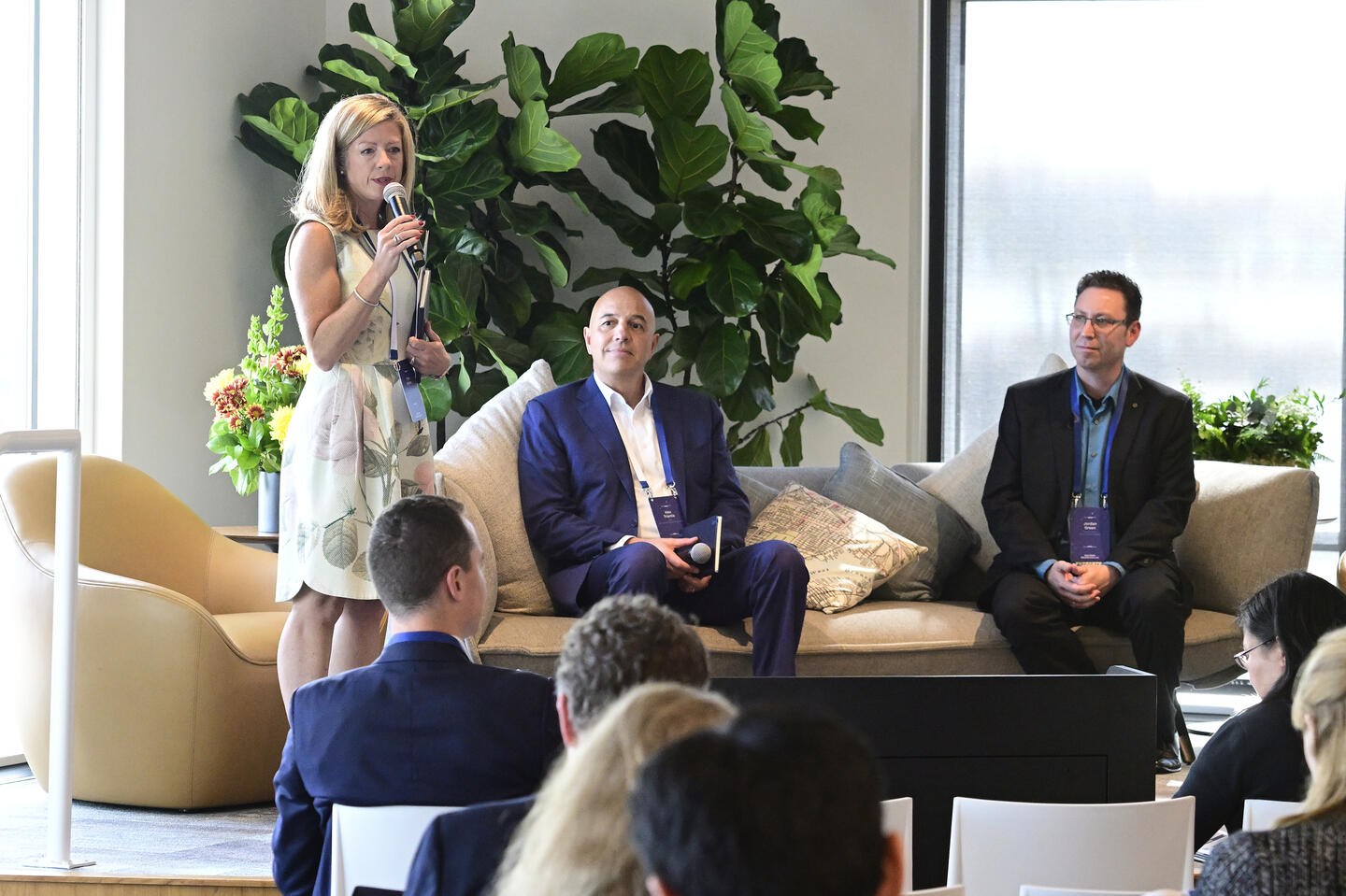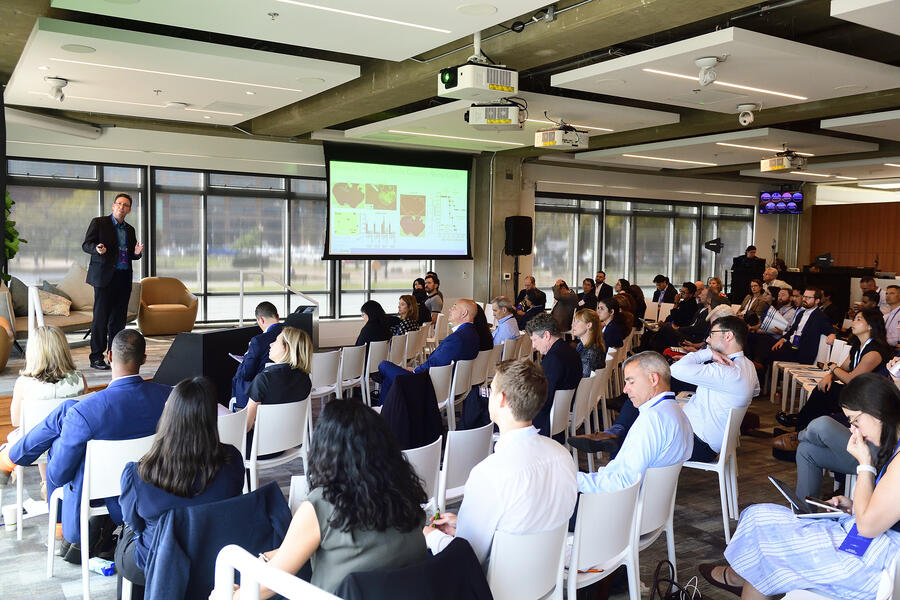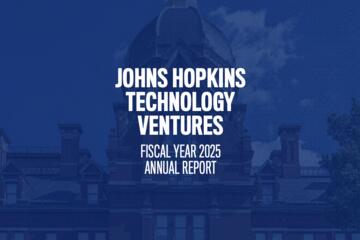- Name
- Doug Donovan
- dougdonovan@jhu.edu
- Office phone
- 443-997-9909
- Cell phone
- 443-462-2947
In the eight decades since the end of World War II, the U.S. research nexus among the federal government, universities, and private industry has generated countless life-changing discoveries and innovation across health care, medicine, technology, and other fields.
Federally funded research has fueled more than 17,000 startups, supported 6.5 million jobs, and contributed $2 trillion to the U.S. economy, according to the most recent annual report from Johns Hopkins Technology Ventures, the division that helps transform Hopkins research and science into patents and products.
Key Takeaways
- Johns Hopkins Technology Ventures' portfolio of 131 startups has raised $4.8 billion in capital and achieved 45 company exits.
- In 2024, 18 new startups were added to JHTV’s portfolio, raising more than $130 million in venture capital, with 56% of that investment staying in Baltimore.
- Federally funded research across the nation has fueled more than 17,000 startups, supported 6.5 million jobs, and contributed $2 trillion to the U.S. economy.
At JHTV's 2025 Innovation Summit, held Sept. 18 at Brown Advisory's Baltimore headquarters, Johns Hopkins scientists gathered to continue that tradition by pitching research and development projects to potential investors looking to further fuel the national pipeline of progress that runs from federal grants to university research to commercialization that benefits the public.
The summit's keynote speaker, Victor Velculescu, a Johns Hopkins oncology professor and successful entrepreneur, told the nearly 200 attendees that artificial intelligence and "next generation diagnostics will completely change how medicine is practiced in the future."
Velculescu, co-director of cancer genetics and epigenetics at the Sidney Kimmel Comprehensive Cancer Center, co-founded the cancer genomic company Personal Genome Diagnostics in 2010. The startup company was the first to provide an FDA-approved test kit for comprehensive genomic profiling for cancer patients, leading to LabCorp's acquisition of the company in 2022. He then continued to build another company, DELFI Diagnostics, which uses a liquid biopsy and machine learning to detect cancer earlier.

Image caption: Myra Norton, senior director of FastForward, with Carey Business School Dean Alex Triantis and Jordan Green, vice chair for research and translation in the Department of Biomedical Engineering
Image credit: Will Kirk / Johns Hopkins University
Velculescu, who first arrived at Hopkins as a combined doctoral-medical degree student in 1992, said Johns Hopkins has rapidly expanded its abilities to help scientist-entrepreneurs.
"There has been a sea change at Johns Hopkins," he said.
Today, Johns Hopkins Technology Ventures touts a portfolio of 131 startups that have raised $4.8 billion in capital and achieved 45 company exits.
For example:
- Somnair, founded by Johns Hopkins alumni Mitchell Turley and Anders Sideris, offers a custom-fitted, mouthguard-like device to treat obstructive sleep apnea.
- Iris Gupta, who earned her bachelor's degree from Johns Hopkins in May in computer science and economics, founded CounselAI, an AI platform that streamlines legal discovery across reams of documents.
- Alex Marder, an engineering professor in JHU's Whiting School of Engineering, started Revalare, a software that detects unsecured cell towers manufactured by foreign companies and automatically redirects phones to secure connections, preventing user data from being accessed by overseas adversaries.
"JHTV serves as a front door for campus innovators and external partnerships alike, ensuring productive collaboration between Johns Hopkins, the government, and industry—a tripartite alliance that leverages the strengths of each sector to save lives," said Christy Wyskiel, executive director of JHTV and senior adviser to the president of Johns Hopkins University for innovation and entrepreneurship.
JHTV's portfolio represents 314 active products, 330 products in development, and 3,805 patents. Its 97 licensing agreements with companies generated $59 million in revenue in fiscal year 2025, according to its annual report.
In addition, Johns Hopkins research projects help to fuel the research and development pipelines of more than 70 corporate partners, including Amazon and Novo Nordisk.
The Johns Hopkins Amazon Initiative for Interactive AI is in its third year and supports 14 doctoral fellows and 23 research awards. It advances innovation, collaboration. and commercialization in AI research. In collaboration with Novo Nordisk and Evotec, Johns Hopkins joined a translational drug discovery accelerator program whose mission is to advance academic discoveries.
In 2024, 18 new startups were added to JHTV's portfolio, raising more than $130 million in venture capital, with 56% of that investment staying in Baltimore. For example, Sonavex Technologies secured $15 million in financing and was included among Time magazine's Best Inventions of 2024.
At last year's innovation summit, Benjamin Larmin, a professor of pathology at the Johns Hopkins School of Medicine, pitched his company Infinity Bio, which specializes in antibody profiling. It raised $8 million in financing led by Illumina Ventures.
This year, more researchers were pitching their science, especially in the field of immunotherapy.
One company, Adventris Pharmaceuticals, partners with cancer Hopkins research Elizabeth Jaffee to develop off-the-shelf vaccines for cancers. The company plans to apply a vaccine in development to its first patient next year.
Jaffee, deputy director of the Sidney Kimmel Comprehensive Cancer Center, has been a vocal champion for the federal research pipeline that has faced unprecedented cuts this year, especially from the National Institutes of Health.
"Due to the investments at the NIH [into] the new technologies, we're in a technological revolution in cancer research," Jaffee said at a recent event touting the promise of mRNA research and therapies. "If we can push this vaccine method forward, we will definitely have an impact in cancer that's going to be unexpected but almost miraculous over the next five to 10 years."
As for cuts to NIH funding, she added: "We don't have a lot of funding for doing these trials beyond the National Institutes of Health. The way things are going, I have to be honest, you're told a day in advance that your grant is cut, so it will be an acute change for patients who are currently being treated in our clinical trials."
Posted in Science+Technology
Tagged tech transfer, nih funding, nsf, johns hopkins technology ventures









